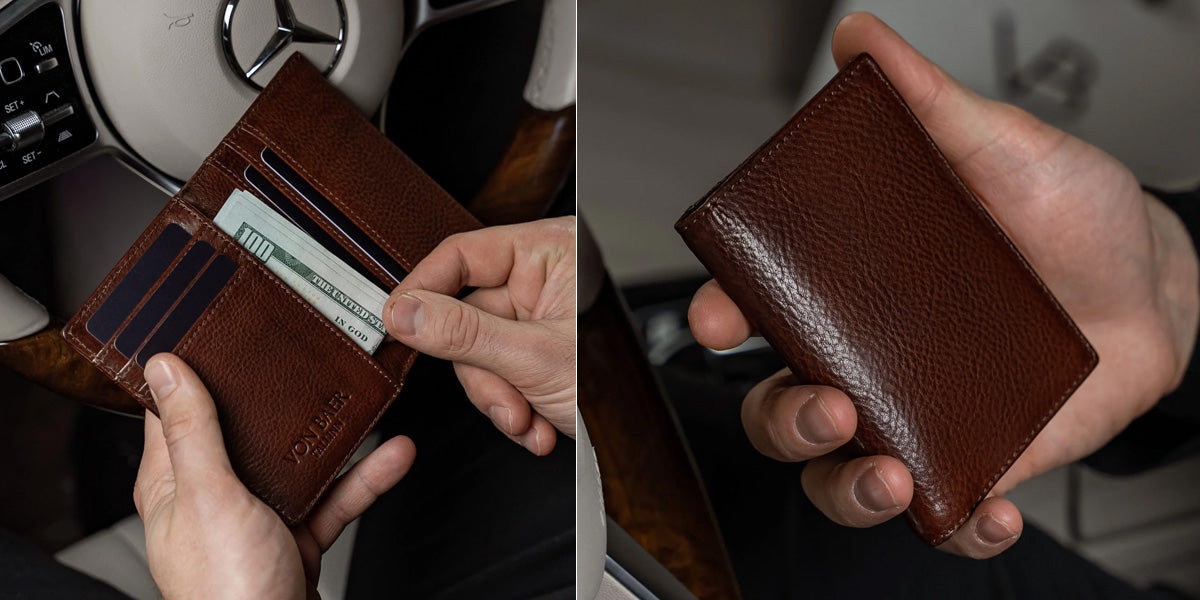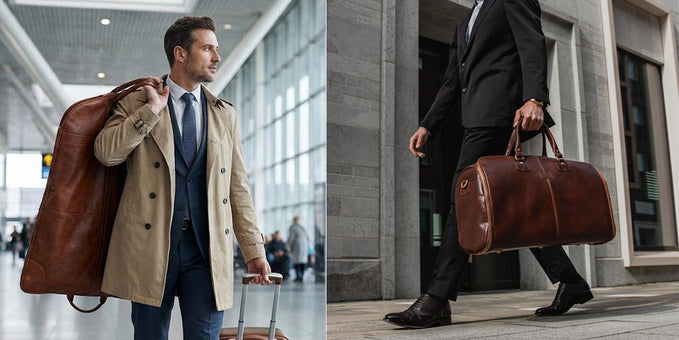What To Put in a Card Holder Wallet

A card holder wallet is designed to include the essentials, without any bulky extras.
Include your primary ID card, your usual debit or credit card, a couple of business cards (if you use them), and a couple of pieces of cash – maybe a five, a twenty, and a fifty to cover most emergency situations from tips to lunch at a cash-only establishment.
Since you will have your phone on hand, leveraging your digital wallet is key.
This ensures that most purchases and receipts are handled in the most streamlined way possible, but that you always have alternatives and backups.
These are the basic principles… now let’s look a little deeper.
Selecting Your Card Holder Style: Beyond Basics
Slim Card Holders
Image: Minimalist Card Holder (link)
Slim card holders are best for those who lean more toward the minimalist side.
They can store a few cards and a few pieces of cash, while remaining very streamlined.
This makes them great for events where you don't want a bulky wallet sticking out of your clothing, such as wearing a suit for a wedding or business meeting.
They serve as a backup to a robust digital wallet setup, and other digital tools like near-field communication (NFC) tags that allow for the sharing of information or web links with a tap of the wallet, eliminating the need for physical business cards.
Bifold Card Holders
Image: Grant Card Case (link)
Bifold card holders are better suited for those who do a lot of international travel, and who engage in face-to-face interactions on a regular basis.
They have a much larger capacity than a slim card holder, making them perfect when you need a lot of cards (such as attending trade shows, or making business payments).
These should include RFID-blocking materials, to protect against digital theft.
In-Depth Considerations for Wallet Contents
Essential Cards

When choosing which card (or cards) to put into your wallet, don’t just pick one at random.
Choose the card that will get the most use from rewards programs and your spending patterns.
Consider cashback first, then compare it to dining rewards, travel rewards, and other card programs.
Professional Needs

For people in sales and other fields that are highly reliant on networking, you should have some kind of digital information sharing.
This way you will never run out of business cards.
You might want to carry one or two, in case the other person is without the means to receive a digital card, but in reality, you will probably never need them.
Lifestyle and Leisure
Many loyalty cards have digital counterparts as well.
Using digital loyalty cards means clearing space in your wallet, and always having the right cards on hand.
This works well for dining cards, transit cards, and even security cards for systems that are compatible.
Health Insurance Card
Carrying your health insurance card can ensure that you receive the right medical care in emergencies.
Emergency services often check wallets for insurance cards if the patient is unable to speak, so it is a good idea to keep a physical card on hand if you have premium insurance and want to get the best possible treatment and care.
Digital Solutions

Digital wallets should include biometric security features, and they should make regular backups of digital cards to the cloud.
Two-step authentication can slow down transactions, but it makes them more secure as well.
Emergency Contact Information
It is a good idea to include a physical card with your wallet, giving emergency contact information in a way that is accessible if your wallet is lost, or if there is an accident and you are unable to give that information yourself.
How This Changes Based on Your Circumstances
- Young Professionals – Keep your budgets efficient while getting the most for your money by using apps that track your spending and categorize it automatically.
- Established Executives – A bifold with room for additional receipts can aid in expense management and organization.
- Creative Freelancers – A wallet with a small, integrated notebook or stylus can support on-the-spot creativity, or easy notetaking and sketches during a client meeting.
- Retirees – These should be safe and easy years, so the wallet should match. Clear ID slots and easy access are key. Also include a health information card with a QR code for easy, quick, and complete access to needed health information.
We wrote an in-depth article about what your wallet says about you here.
Streamlining Your Choices
- Assess and Adapt – At least at first, review your wallet contents each month to see what you use and what you don’t. Remove the things that don’t need to be there (except emergency info cards, of course).
- Seasonal Adjustments – You may have a park pass in the summer, a ski pass in the winter, or some other seasonal item that doesn’t need to be in there all year long.
- Backup Options – Cards with sensitive information on them should be protected by dual-factor authentication. Backups are important too. Cloud backups are accessible even when away from home.
We also discussed if you even need a wallet here.
How Often Should I Review the Contents of My Wallet?
For most people, a review each month for the first several months is a good idea.
It could be less frequent after that, unless you have changes in your lifestyle or circumstances.
Can Digital Wallets Completely Replace Physical Ones?
Even in a high tech utopian, it’s highly unlikely that there will be no cash required, just in case your electronic device runs out of battery, breaks, or becomes lost.
We wrote an article on the best way to carry cash here.
How Can I Secure My Wallet Against Loss or Theft?
Protect the digital information and access to your wallet with RFID-blocking technology.
A Tile or AirTag can track your wallet to aid in recovery after a loss or theft.
In some situations, you may want a wallet with an integrated tether or lock.
You can see a beautiful range of RFID wallets here.
What Should I Do with Receipts If My Wallet Doesn’t Have a Dedicated Compartment?
There are a couple of good option:
- You can digitize your receipts using an app.
- You can carry them in the cash compartment of your wallet if there are only a few.
- If there are many, consider a small envelope or dedicated receipt wallet.
We have a great article to read next about types of wallets here.

Author: Igor Monte
Igor Monte is the co-founder of Von Baer. He's an expert in all things premium leather, from being an end-user right up to the design and manufacturing process. His inside knowledge will help you choose the best leather product for you.
We strive for the highest editorial standards, and to only publish accurate information on our website.
Leave a Comment
Your email address will not be published.








